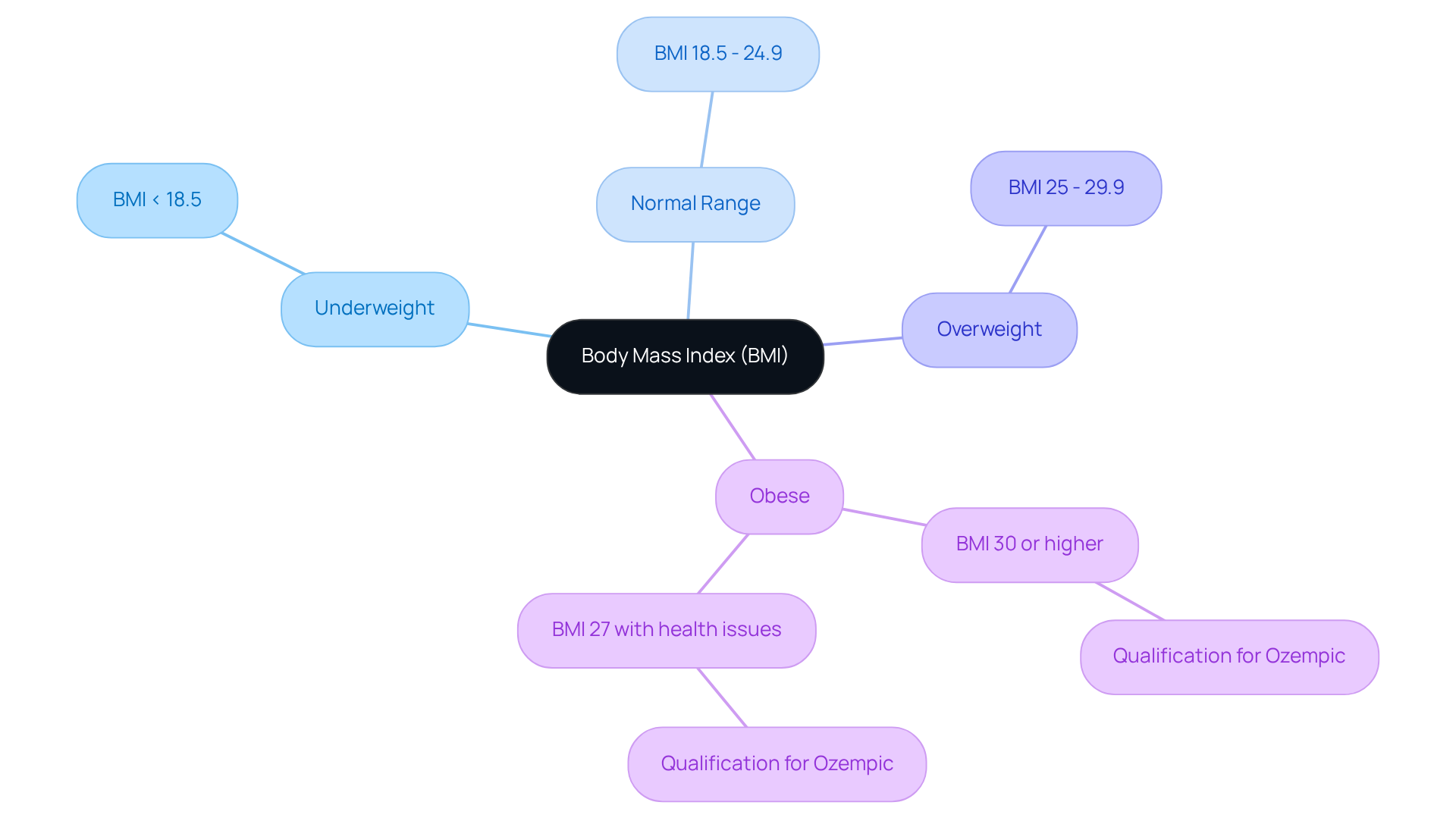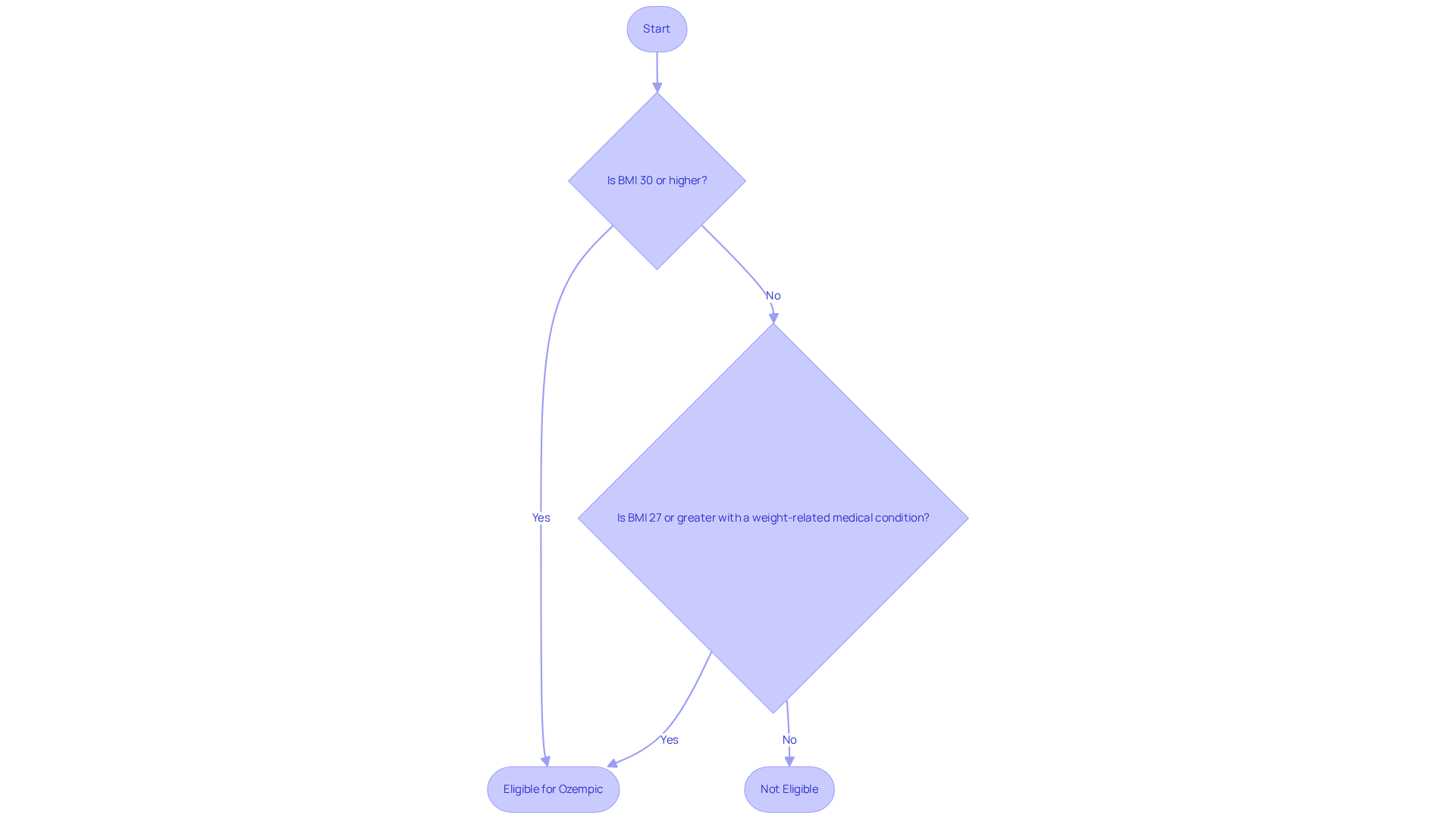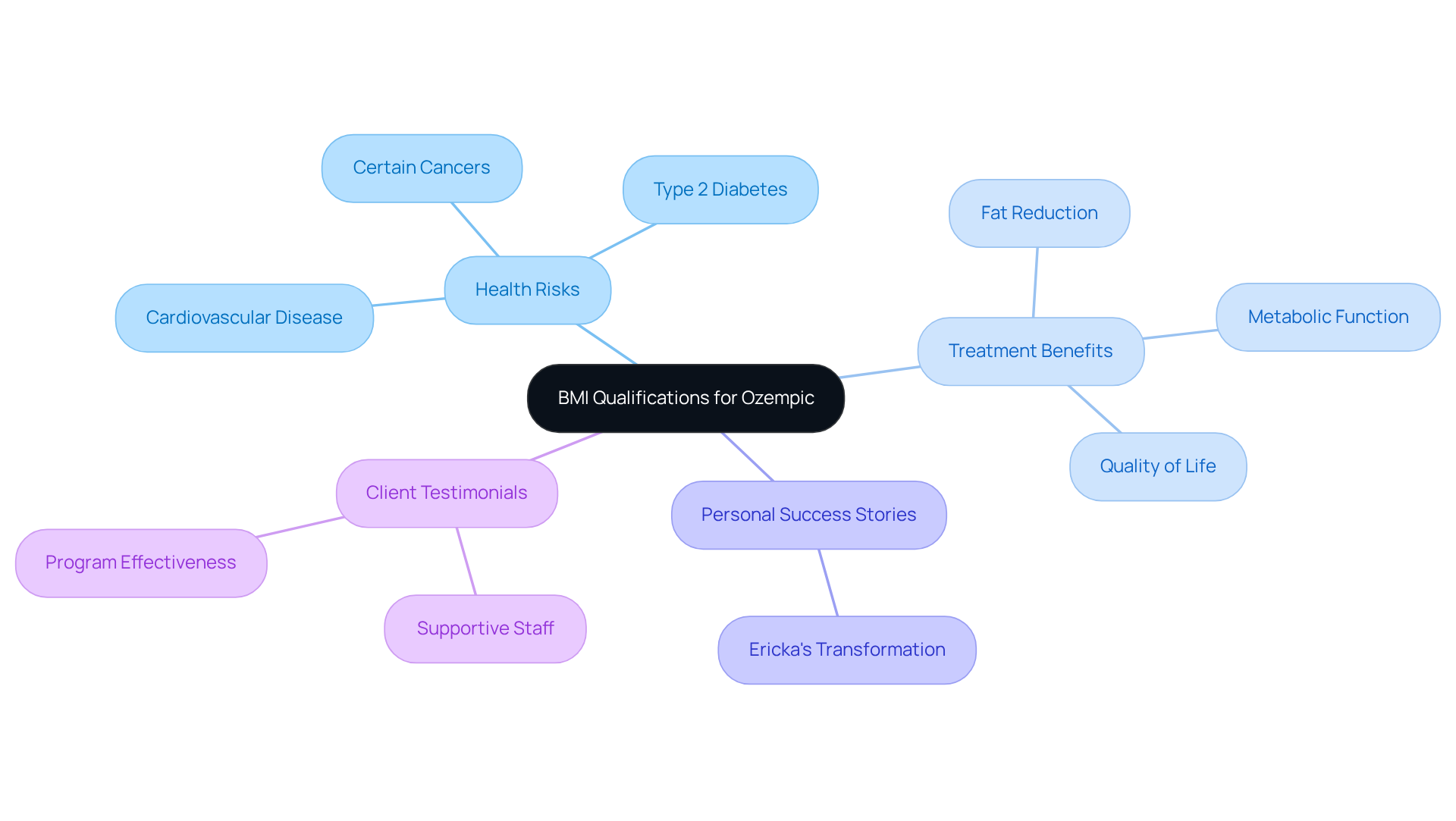Introduction
Understanding Body Mass Index (BMI) is essential for anyone considering weight management options, especially when it comes to medications like Ozempic. We understand that navigating these choices can be overwhelming, and this numerical representation of body fat plays a crucial role in determining eligibility for treatment. It ensures that individuals who stand to benefit the most receive the necessary support.
However, the relationship between BMI and medication qualification raises important questions. What happens when a simple number dictates access to potentially life-changing treatments? As we delve deeper into the complexities of obesity and its implications for health, it becomes clear that understanding BMI qualifications is vital for making informed decisions.
You’re not alone in this journey. Many face similar challenges, and it’s important to recognize that a deeper understanding of BMI can empower you to take control of your health. In addition, by exploring these qualifications, we can foster a more compassionate approach to weight management that prioritizes individual needs and circumstances.
Define BMI and Its Role in Ozempic Qualification
Body Mass Index (BMI) is more than just a number; it serves as a vital screening tool that helps us understand body mass in relation to height. By dividing a person’s mass in kilograms by the square of their height in meters (kg/m²), we get a simple numeric indication of body fat. The classifications are straightforward:
- Underweight (BMI < 18.5)
- Normal range (18.5-24.9)
- Overweight (25-29.9)
- Obese (30 or higher)
If you’re considering Ozempic, it’s crucial to understand the BMI qualification for Ozempic. It directly influences your BMI qualification for Ozempic medication. The BMI qualification for Ozempic indicates that the medication is primarily recommended for individuals with a BMI of 30 or higher, or for those with a BMI of 27 or higher who also face weight-related health issues, such as type 2 diabetes or hypertension. This classification helps healthcare providers identify patients who could benefit from pharmacological interventions, paving the way for effective management of their conditions.
However, it’s important to remember that BMI alone doesn’t tell the whole story. Healthcare professionals stress the need for a comprehensive assessment. For instance, the Edmonton Obesity Staging System considers additional wellness factors, offering a more nuanced understanding of a person’s overall well-being. This broader perspective is essential, as it recognizes that obesity is a complex metabolic disease shaped by various biological and environmental influences. As Dr. Jastreboff wisely states, ‘Obesity is a complex metabolic disease with a clear biological basis, and we can treat it with targeted therapy aimed at the biology.’
Real-world examples highlight how the BMI qualification for Ozempic affects eligibility. Many individuals with a BMI of 30 or above discover that their BMI qualification for Ozempic opens doors to effective treatment options. Similarly, individuals who meet the BMI qualification for Ozempic of 27 and also face health challenges can access these crucial resources. This understanding reinforces the importance of approaching weight management discussions with sensitivity and a commitment to comprehensive care.
We understand that navigating these topics can be overwhelming, but you’re not alone in this journey. By fostering a compassionate dialogue, we can work together towards better health outcomes.

Outline Eligibility Criteria for Ozempic Based on BMI
We understand that navigating weight management can be challenging. To meet the BMI qualification for Ozempic, individuals must fulfill specific criteria, which can sometimes feel overwhelming. A BMI of 30 or higher is the BMI qualification for Ozempic, which categorizes a person as obese and makes them eligible for this medication. Alternatively, if your BMI is 27 or greater and you have at least one weight-related medical condition, you may meet the BMI qualification for Ozempic, which includes conditions like hypertension, type 2 diabetes, or dyslipidemia.
These guidelines are designed with your best interests in mind, ensuring that Ozempic is prescribed to those who are most likely to benefit from its weight-loss effects. Healthcare providers conduct thorough evaluations, taking the time to examine your medical history and current condition to determine eligibility.
In addition, this organized method guarantees that you receive personalized care tailored to your unique medical needs. You’re not alone in this journey; support is available to help you achieve your health goals.

Discuss Health Implications of BMI Qualifications for Ozempic
The bmi qualification for ozempic has significant implications for those seeking effective weight loss solutions. We understand that obesity, defined by a BMI of 30 or greater, comes with serious risks, including cardiovascular disease, type 2 diabetes, and certain cancers. Establishing bmi qualification for ozempic allows healthcare providers to identify individuals at heightened risk who may benefit from medical intervention.
Ozempic has shown promise in promoting substantial fat reduction, enhancing metabolic function, and lowering the risk of obesity-related complications for patients who meet the bmi qualification for ozempic of 27 or above and face challenges related to excess body mass. This targeted approach not only supports effective weight management but also improves overall quality of life, highlighting its vital role in the comprehensive treatment of obesity.
Moreover, recent studies suggest that individuals using Ozempic can experience significant wellness improvements. This reinforces the importance of considering the bmi qualification for ozempic as a key factor in obesity treatment strategies. Medical professionals emphasize that a thorough assessment of health, including the bmi qualification for ozempic and related conditions, is essential for optimizing treatment outcomes and addressing the complex nature of obesity.
A compelling example is Ericka’s real-time transformation journey at CT Medical Loss & Beyond. She achieved an impressive 18 lbs loss and reduced her body fat percentage from 31% to 22.8%. Her success story illustrates the personalized medical weight loss solutions offered by CT Medical, tailored to meet individual needs and goals.
Testimonials from satisfied clients further affirm the program’s effectiveness, showcasing the knowledgeable and supportive staff who provide ongoing encouragement throughout the weight loss journey. By considering the bmi qualification for ozempic and personalizing treatment, CT Medical Weight Loss & Beyond shows a heartfelt commitment to improving patient health and well-being. You’re not alone in this journey; support is available to help you achieve your goals.

Conclusion
Understanding the BMI qualification for Ozempic is essential for anyone navigating the challenges of obesity and weight-related health issues. This qualification not only determines eligibility for the medication but also underscores the importance of a thorough assessment of an individual’s health status. We recognize that obesity is a complex condition influenced by various factors, and addressing it effectively requires a compassionate approach.
The article highlights key insights regarding BMI classifications and their implications for Ozempic qualification. A BMI of 30 or higher qualifies individuals for this medication, while those with a BMI of 27 or above who also face health challenges may also be eligible. This structured approach helps healthcare providers identify patients who stand to benefit most from Ozempic, ultimately promoting better health outcomes.
In addition to these insights, it’s clear that understanding BMI qualifications goes beyond mere numbers; it’s about creating a supportive environment for those on their weight management journey. By engaging in compassionate discussions and considering personalized treatment options, individuals can navigate their health challenges more effectively. You’re not alone in this journey – embracing this knowledge empowers you to take proactive steps towards improved health and well-being.
Frequently Asked Questions
What is BMI and how is it calculated?
Body Mass Index (BMI) is a screening tool that helps understand body mass in relation to height. It is calculated by dividing a person’s mass in kilograms by the square of their height in meters (kg/m²).
What are the BMI classifications?
The BMI classifications are as follows: Underweight (BMI < 18.5), Normal range (18.5-24.9), Overweight (25-29.9), and Obese (30 or higher).
What is the BMI qualification for Ozempic?
Ozempic is primarily recommended for individuals with a BMI of 30 or higher, or for those with a BMI of 27 or higher who also have weight-related health issues, such as type 2 diabetes or hypertension.
Why is BMI important for Ozempic qualification?
BMI is important for Ozempic qualification as it helps healthcare providers identify patients who could benefit from pharmacological interventions to effectively manage their conditions.
Does BMI provide a complete picture of an individual’s health?
No, BMI alone does not tell the whole story. Healthcare professionals emphasize the need for a comprehensive assessment, considering additional wellness factors for a more nuanced understanding of overall well-being.
What is the Edmonton Obesity Staging System?
The Edmonton Obesity Staging System is a framework that considers additional wellness factors, providing a broader perspective on obesity as a complex metabolic disease influenced by various biological and environmental factors.
How does the BMI qualification for Ozempic affect eligibility?
Individuals with a BMI of 30 or above may find that their BMI qualification for Ozempic opens doors to effective treatment options. Similarly, those with a BMI of 27 who also face health challenges can access these crucial resources.
How should discussions about weight management be approached?
Discussions about weight management should be approached with sensitivity and a commitment to comprehensive care, recognizing the complexity of obesity and the importance of compassionate dialogue.




